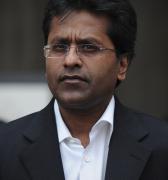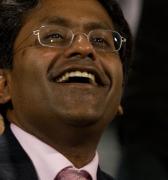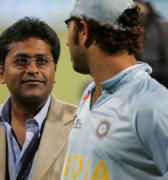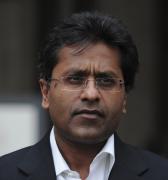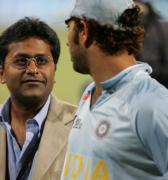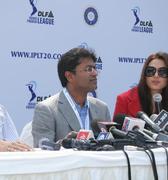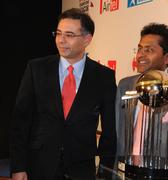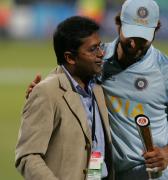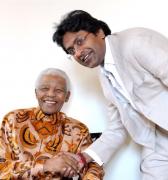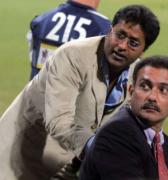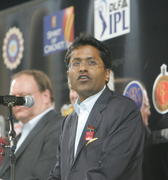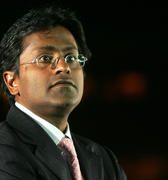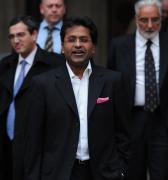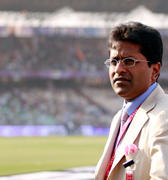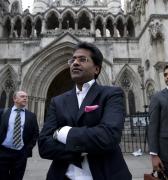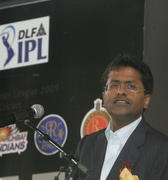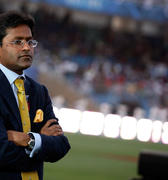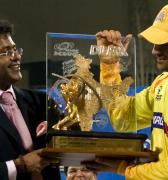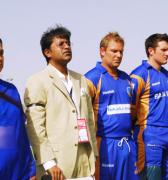Disastrous if India lose voice: Star CEO
Star India not renewing jersey sponsorship for Indian cricket team
Star India, the television network, has warned that if the BCCI is not allowed to play a "leading role" in cricket administration, the consequences for the game could be "disastrous."
Star holds the broadcast rights for cricket in India and ICC events from 2015 to 2023 and their chief executive officer Uday Shankar said the risk of doing business was "very, very high" at a time when the BCCI has been pushed into a corner by the ICC.
Shankar was referring to the ICC's decision to roll back the Big Three reforms. And as part of that, they proposed a new financial model which said the BCCI's projected earnings for the current rights cycle could be as low as half of what was estimated in 2014.
BCCI raised opposition to this new financial model, arguing that it was neither transparent nor backed up with scientific proof. However, with an 8-2 majority vote, it was passed and then accepted in principle as well. All that remains is a final ratification by the ICC board, which is expected to happen in June, but the BCCI are confident of gaining enough support to stall.
"If India lose their voice or even if they are not playing a leading role, it would be disastrous for global cricket," Shankar told the Times of India. "The country that delivers the largest share of fans and also the largest share of money in global cricket should have a say in the critical affairs of the game. It is in the best interest of cricket as a whole. The game can't get stronger without it becoming stronger in India. We must ensure that we aren't throwing the baby with the bathwater.
"For us, the problem is, right now we do not see a consensual leadership in cricket. The power of cricket came from the fact that everybody was aligned. The global cricket leadership was generally aligned to drive it forward. The alignment seems to have broken down. Lack of clarity both, in ICC as well as BCCI, is our biggest concern right now. We have nothing to do with the politics of cricket. Currently we have invested in cricket more than any other media company has ever done. Our investments in the game are to the tune of a few billion dollars. And hence the business risk for us is very very high."
Star has paid close to USD 1.9 billion to secure the broadcasting rights for 18 ICC events until 2023 and they believe the mood in India - widely acknowledged as the biggest market for ICC events - is highly important. "The centrality of India, a country that generates so much revenue for global cricket, is crucial. The percentage share of revenue that India generates is very high but the percentage share of viewership that India generates is even higher. And our take here is that nothing should be done to weaken or demotivate that enthusiasm. The consequences of that will be devastating."
Shankar said Star would honour all its existing deals with BCCI as well as other boards, but would be "very careful" before entering future contracts. Their six-year deal with the Indian board, including mobile and internet rights, ends in 2018 and is worth approximately USD 750 million.
Star, also the team sponsor for India, said they would not be renewing the agreement which expires on March 31.
"Given all the volatility, we are indeed concerned about the health of cricket in the days ahead. No one seems to be talking about making cricket bigger and more popular. We have been very proud that our name is carried on the jersey of Team India. But given all the uncertainties, we have decided not to bid for it again. The commitments being asked for are too onerous without any clarity.
"We have no clarity on the Future Tours Program. The contract [with BCCI] says schedules can be changed at the will of BCCI and all that how does that work? The minimum price has already been fixed for each match that the bidder has to pay. Now, can the value for an India-Australia series be the same as that for an India-Zimbabwe game? Is it the same for a Test with Bangladesh as it would be for an ODI or T20 with England or Australia? We have no clarity on any of this. So, on what basis does a potential bidder walk into this?"
Star India, the television network, has warned that if the BCCI is not allowed to play a "leading role" in cricket administration, the consequences for the game could be "disastrous."
Star holds the broadcast rights for cricket in India and ICC events from 2015 to 2023 and their chief executive officer Uday Shankar said the risk of doing business was "very, very high" at a time when the BCCI has been pushed into a corner by the ICC.
Shankar was referring to the ICC's decision to roll back the Big Three reforms. And as part of that, they proposed a new financial model which said the BCCI's projected earnings for the current rights cycle could be as low as half of what was estimated in 2014.
BCCI raised opposition to this new financial model, arguing that it was neither transparent nor backed up with scientific proof. However, with an 8-2 majority vote, it was passed and then accepted in principle as well. All that remains is a final ratification by the ICC board, which is expected to happen in June, but the BCCI are confident of gaining enough support to stall.
"If India lose their voice or even if they are not playing a leading role, it would be disastrous for global cricket," Shankar told the Times of India. "The country that delivers the largest share of fans and also the largest share of money in global cricket should have a say in the critical affairs of the game. It is in the best interest of cricket as a whole. The game can't get stronger without it becoming stronger in India. We must ensure that we aren't throwing the baby with the bathwater.
"For us, the problem is, right now we do not see a consensual leadership in cricket. The power of cricket came from the fact that everybody was aligned. The global cricket leadership was generally aligned to drive it forward. The alignment seems to have broken down. Lack of clarity both, in ICC as well as BCCI, is our biggest concern right now. We have nothing to do with the politics of cricket. Currently we have invested in cricket more than any other media company has ever done. Our investments in the game are to the tune of a few billion dollars. And hence the business risk for us is very very high."
Star has paid close to USD 1.9 billion to secure the broadcasting rights for 18 ICC events until 2023 and they believe the mood in India - widely acknowledged as the biggest market for ICC events - is highly important. "The centrality of India, a country that generates so much revenue for global cricket, is crucial. The percentage share of revenue that India generates is very high but the percentage share of viewership that India generates is even higher. And our take here is that nothing should be done to weaken or demotivate that enthusiasm. The consequences of that will be devastating."
Shankar said Star would honour all its existing deals with BCCI as well as other boards, but would be "very careful" before entering future contracts. Their six-year deal with the Indian board, including mobile and internet rights, ends in 2018 and is worth approximately USD 750 million.
Star, also the team sponsor for India, said they would not be renewing the agreement which expires on March 31.
"Given all the volatility, we are indeed concerned about the health of cricket in the days ahead. No one seems to be talking about making cricket bigger and more popular. We have been very proud that our name is carried on the jersey of Team India. But given all the uncertainties, we have decided not to bid for it again. The commitments being asked for are too onerous without any clarity.
"We have no clarity on the Future Tours Program. The contract [with BCCI] says schedules can be changed at the will of BCCI and all that how does that work? The minimum price has already been fixed for each match that the bidder has to pay. Now, can the value for an India-Australia series be the same as that for an India-Zimbabwe game? Is it the same for a Test with Bangladesh as it would be for an ODI or T20 with England or Australia? We have no clarity on any of this. So, on what basis does a potential bidder walk into this?"


















